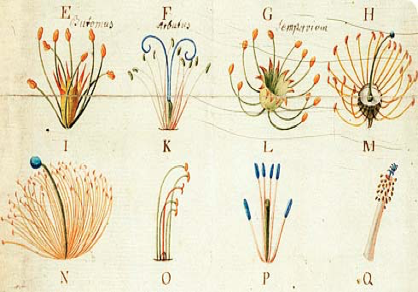Call for abstracts – Plantarium: Human-Vegetal Ecologies
Edited by Olga Cielemęcka and Marianna Szczygielska

Plant life is usually perceived, both in philosophy and commonsensically, as a lower (immobile, non-sentient, passive) form of being. Against this tradition, new multidisciplinary approaches come to view. Plants constitute not only potent metaphors for human relationship to the land, mobility, and fertility, but also determine in concrete, empirical ways human livelihoods, diets, health, landscape, urban design, economies, histories of belonging, domination, conquest, and “weeding out” (Schiebinger 1993). Plants are active agents participating in “the romance connecting people, plants, and places” (Tsing 2012). Emerging fields of research such as plant studies (Foster 2016, Marder 2013), queer ecologies (Mortimer-Sandilands and Erickson 2010), multispecies ethnographies (Haraway 2008; Kirksey and Helmreich 2010), human geography ( Foster and Sandberg 2004, Head 2015,), food studies (Shiva 2000, Carney 2001), feminist new materialisms (van der Tuin and Dolphijn 2012; Myers 2015), and political ecology, among others, point to the intensive traffic in meanings and matter between plants, places and humans. Simultaneously, there are multiple practices rooted in urban activism, grassroots community building, indigenous knowledges, and artistic experimentations, which explore and redefine intimate human-plant relations and dependencies. “Plantarium” aims at mobilizing these theoretical advances, artistic actions, and activist practices in a series of thought-provoking and grounded interventions.
“Plantarium” grows out of the budding debates within environmental humanities around plant life, thinking, and agency. The project looks into the vegetal not only through the lenses of its symbolic and visual representations – e.g. analysed as a motif in art or literature, but also, through exercising “plant-thinking” (Marder 2013) it seeks ways of reimagining of subjectivity, agency, and motility in the wake of the posthuman turn, as well as of recalibrating the discussions on ethical responsibility and environmental justice, which would respect and account for the plant others. These new ecologies sprout into territories of politically valent social struggles for queer, minority, and indigenous rights. “Plantarium” special issue intends to offer botanical thought as a way of crossing the taxonomic boundaries and normative classifications, and by that, trouble classical, discrete notions of identity, subjectivity, life, environment, nature, and culture.
Possible topics include, but are not limited to the following issues:
● Plants and environmental justice;
● Queer botanical ecologies: sexuality, sensuality, reproduction;
● From plant nonhuman ontologies to vegetal philosophies;
● Plant and vegetal life in bioart, art, architecture, design;
● Botanical accounts in history of science;
● Indigenous plant cosmologies;
● Plants in anti-colonial perspectives;
● Human-plant entanglements in a biopolitical perspective;
● Materiality of botanics, gardening, food production and other plant practices;
● Gardens, herbariums, and other botanical collections;
● Seeds, weeds, and biopiracy;
● Land and agriculture in a vegetal-oriented analysis;
● Plants in the wake of the Anthropocene;
● Trans-plants: mobility, borders, and plant-human belonging.
Rethinking the generative potentialities of the botanical calls for collaborative efforts to bring to life new praxes within such varied fields as art, activism, architecture, urban planning, literature, and academic interventions. Therefore, we encourage both traditionally academic submissions (5000-9000 words), as well as visual materials, provocations (5000-9000 words), review essays (3000-6000 words), activist reports and commentary pieces (1000-3000 words), and other varying genres.
Submission guidelines:
Due September 29, 2017 to plantarium2017[at]gmail.com as word documents (.doc or .docx).
Extended abstract of 500 words. The abstract should include: title, author’s/s’ name, current affiliation and email address, and maximum five key words.
1-page CV.
Only previously unpublished (in English) work, not currently under review by other publishers will be considered.
Notifications will follow by October 10, 2017. Full submissions due December 18, 2017 for peer-review process. Publication is envisaged in an open-access peer-reviewed journal on environmental humanities.
COST Action IS1307 New Materialism: Networking European Scholarship on 'How Matter Comes to Matter'.
Here you will find background material, current activities, calls for papers, working group information, and project outputs.
With the changing of societies on local, national and international scales owing to economic, ecological, political and technological developments and crises, a reorganized academic landscape can be observed to be emerging. Scholarship strives to become increasingly interdisciplinary in order to grasp and examine the unfolding complexity of ongoing ecological, socio-cultural and politico-economic changes. Additionally, academics forge... Read more or find out Who's Who
- Call for Papers - Technology Matters and Matters of Technology: Exploring Theories of "Materiality" for Technology Research - June 25, 2018
- The return of materialism(s)? Matter between science, theory and art - University of Iceland
- Call for Entries - New Materialism Almanac 2018
- Urban Matters: Material Engagements with Communities and Borders in Times of Movement
Information relating to activities undertaken, including conferences, training schools, short-term scientific missions, and annual meetings, are archived here.
Filter activities by:
Conference7
Other7
STSM7
Training School7
- 7th Annual Conference: Performing Situated Knowledges: Space, Time, Vulnerability
- From Cosmos to Genes: New Materialist Methodologies Crossing the Humanities, Natural, and Technosciences
- MC Meetings: Barcelona, Maribor and Warsaw
- Training School 2: Research Genealogies and Material Practices
Working Groups focus on four key areas of research
Working Group One
Genealogies of New Materialisms; examines and intervenes in canonization processes by compiling a web-based bibliography, coordinating the OST 068/13 8 EN... Read more
Working Group Two
New Materialisms on the Crossroads of the Natural and Human Sciences; seeks to develop new materialisms at the boundaries of the human and natural sciences. The group focuses on how European new materialisms can rework the ‘Two Cultures' gap... Read more
Working Group Three
New Materialisms Embracing the Creative Arts; brings together European researchers, artists, museum professionals, and other activists with a keen interest in the material... Read more
Working Group Four
New Materialisms Tackling Economical and Identity – Political Crises and Organizational Experiments... Read more
2016–18
The Almanac comprises contributions from members of working groups, and participants in related activities, delineating key terms, more esoteric neologisms, and short provocations. Read more
New Materialism —
Networking European Scholarship on 'How matter comes to matter’

Website by Second Cousins

